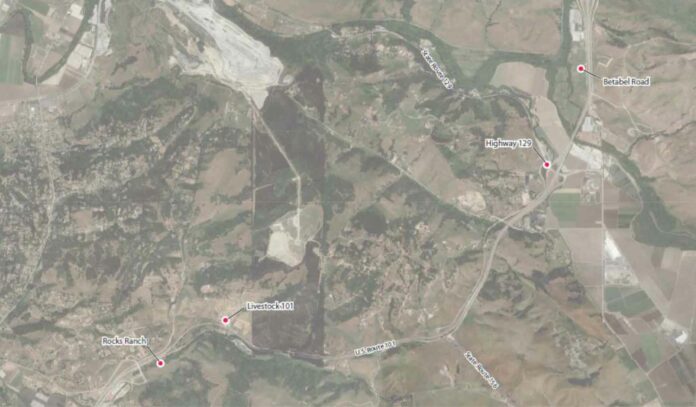After hearing an outcry from opposing residents, San Benito County planning commissioners this week approved recommending zone changes that would allow commercial development along Highway 101.
The appointed planners unanimously OK’d adding a “Regional Commercial” zoning designation to the county code and changing the zoning in four areas to that classification. The intersections include Highway 101 at Betabel Road, Highway 129, San Juan Road and Cole Road.
Current zoning designations in those areas mostly include a mix of agricultural rangeland, agricultural productive and rural, while the Livestock 101 operation has commercial zoning already. The size of the respective areas include 56 acres at Betabel, 40 acres at Highway 129 and Searle Road, 72 acres at San Juan Road, and 159 acres at Cole Road.
The moves would implement plans that are part of the 2035 General Plan as approved in 2015, while the San Benito County Board will make final decisions on the considerations.
Commercial uses could include shopping centers, truck and automobile stations, tourist-serving commercial uses, and hotels/motels, according to the agenda. No specific projects are proposed or approved for the locations.
The zoning decisions came after an array of residents from Aromas and San Juan Bautista spoke out against the changes. Opponents expressed concerns that included loss of ag land, impacts to scenic vistas, lack of an environmental review process in place for related projects, a lacking fiscal analysis, water scarcity, the artificial nature of “themes” attached to the four nodes, not enough community engagement, added congestion on Highway 101 and other criticisms.
Among those development themes mentioned Wednesday for specific nodes included “Old California Village,” “Vineyard” and “Dude Ranch”, while opponents referred to such designations as “Disneyland” in their approach.
Supporters have pointed to the potential sales-tax revenue generation from additional commercial development with the hopes of capturing traffic on the busy thoroughfare, and noted how there would be limits put in place to ensure the commercial developments are not so obstructive. Commissioners in support of the agreement also underscored how the actions merely enacted the 2035 General Plan’s intentions as approved four years ago, and that any specific project would have to go through its own approval process.
The chairman of the commission, though, went as far as to argue the property owners have the right to do anything they please on their land.
“Those property owners have rights, too – to do what they want with their land,” said commission Chairman Robert Rodriguez.
He went on: “We’re just here to make decisions for those property owners. … We can’t take property owners’ rights away.”

Rodriguez directly responded to comments from Aromas resident Andy Hsia-Coron, who had told the commission during public comment that citizens have other avenues to challenge such decisions such as referendums, initiatives and recalls.
“You can’t drag on something that you lost,” Rodriguez said.
Hsia-Coron begged to differ.
“This is bad decision making,” Hsia-Coron said. “For all those here in the audience, this decision is not going to stand.”
Hsia-Coron and his wife Mary were among the majority of speakers who were against the zoning changes. He said the stretch is one of the most beautiful areas left on Highway 101 and the commercial developments would add a lot of traffic congestion.
“It’s very clear that the people on this western flank of San Benito County were not in anyway solicited or engaged in this discussion that will change the lives of the people on this end of the county,” he said.
Gina Paolini with the Preserve Our Rural Communities group that is advocating for preservation of natural resources told commissioners her group’s members had collected three petitions with signatures of residents opposed to the project. She questioned why there was no fiscal impact analysis to help justify the moves and surmised that any hotels in the area would be lower end, adding how the county doesn’t have a tourism base to support such lodging.
“Where’s the fiscal impact analysis that would determine if this is necessary?” she said.
Scott Fuller and Graham Mackie, on the other hand, spoke on behalf of the San Benito County Business Council in favor of the changes. Fuller is overseeing development of the San Juan Oaks senior housing community, and Mackie was an owner of Dassel’s Petroleum before a sale in 2016.
They both offered compliments to the staff on their reports. Fuller mentioned how the county and board of supervisors have been seeking ways to promote additional commercial development well before the current general plan’s approval in 2015. He said the zoning changes would not equate to re-formulating the general plan.
“This is enacting the general plan,” Fuller said. “This is making your zoning consistent with the general plan.”
Fuller also argued the development categories “are not destinations that are adding to traffic.”
“This is to attract traffic that is already there,” he said.
Aside from Mackie and Fuller, there were two property owners at the nodes who spoke in favor of the zoning changes. They were out-numbered at Wednesday’s meeting by a dozen residents who took to the podium in opposition.
Rachel Wohlander and her sister, whose family operates an educational farm in Aromas, echoed several complaints from speakers about the node themes.
“When we have extremely authentic opportunities to offer, I really resent these Disnleyland themes,” she said. “I don’t think it’s what people want.”
Commissioners, meanwhile, offered brief explanations for their viewpoints before the decisions, including the one who represents the Aromas area.
“There were not a lot of people coming to comment about the general plan or about the issues that are there,” District 2 Commissioner Val Egland said of the update process years ago, before commenting on concerns about lacking commission engagement on the matter. “Land issues are always very difficult to handle. I believe that was the expectation of the group gathered here, is that there should be a brisk dialogue about it.”




